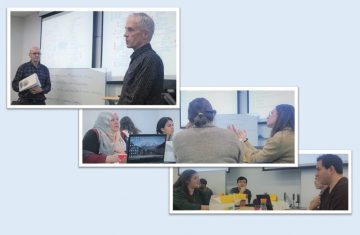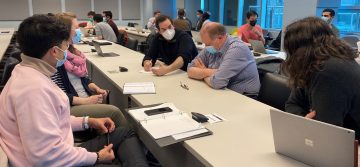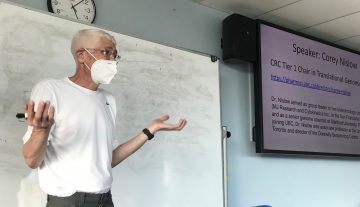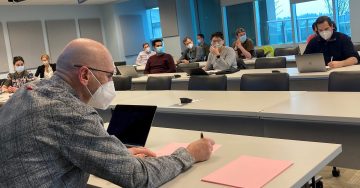The Entrepreneurship Micro-Courses were developed and delivered as a strategic cross-faculty initiative by the Faculty of Medicine with support from Sauder School of Business. After a Pilot was run in November 2021, a total of three micro-courses covering fundamental topics of entrepreneurship in health ran from February-May 2022. The Micro-Courses were available to be taken individually or be bundled. The initial set of courses focused on the “identification of need” phase.
Entrepreneurship Micro-Course Pilot

On 19 November 2021, the ATM hosted the first of a series of workshops to increase knowledge around entrepreneurship and commercialization in science and health innovation at UBC.
The workshop featured presentations and guided discussions on the framework for entrepreneurship in translational medicine at UBC, and was organized and hosted in collaboration with:
- Paul Cubbon, Assistant Dean, Innovation, Sauder School of Business.
- Blair Simonite, Program Director at entrepreneurship@ubc and Adjunct Professor, Sauder School of Business.
- David Huntsman, Director of OVCARE and Professor, Departments of Pathology and Laboratory Medicine and Obstetrics and Gynaecology.
Participants workshopped ideas on the importance, formats and goals of translational medicine in academia and the education and training they would like to see. Feedback guided the topics and presenters for a series of five workshops in Spring 2022.
Entrepreneurship Micro-Course Module 1
 In this micro-course participants learned to use the Value Proposition Canvas to hypothesize about customers’ needs, which usually are more complex than you first think. The workshop explored the various customer roles in healthcare, and the value your solution needs to provide to each (your “value propositions”) in order for your company to be successful. The ability to think of value propositions for real people is fundamental to creating a successful company and is the critical first step in the customer discovery process participants learned about in future modules. The workshop focused on the skills that can improve the odds of success for translational research grant applications.
In this micro-course participants learned to use the Value Proposition Canvas to hypothesize about customers’ needs, which usually are more complex than you first think. The workshop explored the various customer roles in healthcare, and the value your solution needs to provide to each (your “value propositions”) in order for your company to be successful. The ability to think of value propositions for real people is fundamental to creating a successful company and is the critical first step in the customer discovery process participants learned about in future modules. The workshop focused on the skills that can improve the odds of success for translational research grant applications.
Entrepreneurship Micro-Course Module 2
 In this module, participants learned to map current and future competitors and potential partners to understand the space that they want to play in. Guest speaker Dr. Corey Nislow gave an overview of the steps involved in the development of a new drug based on experiences from his own career, including working at several biotechnology companies, Stanford University, University of Toronto and now as a professor at the UBC Faculty of Pharmaceutical Sciences. The ability to understand the market is fundamental to creating a successful company, and is a critical step in the successful approach to raising funds for a new company. Participants discovered these skills can also improve the odds of success for translational research grant applications.
In this module, participants learned to map current and future competitors and potential partners to understand the space that they want to play in. Guest speaker Dr. Corey Nislow gave an overview of the steps involved in the development of a new drug based on experiences from his own career, including working at several biotechnology companies, Stanford University, University of Toronto and now as a professor at the UBC Faculty of Pharmaceutical Sciences. The ability to understand the market is fundamental to creating a successful company, and is a critical step in the successful approach to raising funds for a new company. Participants discovered these skills can also improve the odds of success for translational research grant applications.
Entrepreneurship Micro-Course Module 3

This module covered some of the fundamental principles that inform how Healthcare buys. This links back to the Module 1 concept on customer hierarchy, but in this module, they learned to “follow the money.” Key differences were highlighted between therapeutics where pharmaceutical companies are involved versus diagnostics and devices, and also between public payer and private insurance models. At the end of this workshop, participants were able to understand the players that impact the economics and cost structure of the category in which you will participate and the implications for decision-making at different stages of development. This workshop was run by:
- Paul Cubbon, Assistant Dean, Innovation Sauder School of Business
- Blair Simonite, Adjunct Professor, Entrepreneurship and Innovation Group at Sauder, Entrepreneur-in-Residence at entrepreneurship@ubc
- Rotating guests from the Faculty of Medicine.